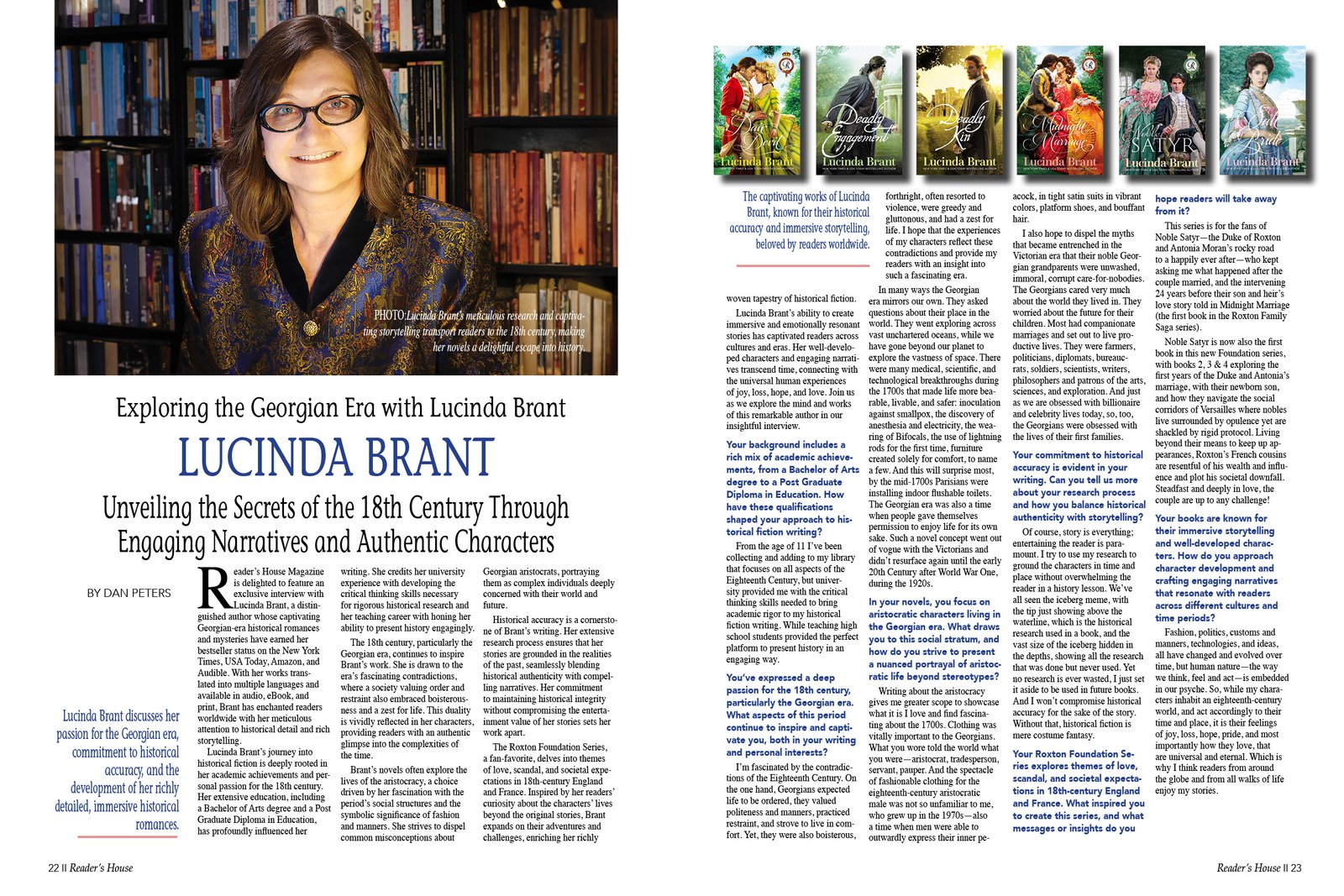Unveiling the Secrets of the 18th Century Through Engaging Narratives and Authentic Characters
Lucinda Brant discusses her passion for the Georgian era, commitment to historical accuracy, and the development of her richly detailed, immersive historical romances.
Reader’s House Magazine is delighted to feature an exclusive interview with Lucinda Brant, a distinguished author whose captivating Georgian-era historical romances and mysteries have earned her bestseller status on the New York Times, USA Today, Amazon, and Audible. With her works translated into multiple languages and available in audio, eBook, and print, Brant has enchanted readers worldwide with her meticulous attention to historical detail and rich storytelling.
Lucinda Brant’s journey into historical fiction is deeply rooted in her academic achievements and personal passion for the 18th century. Her extensive education, including a Bachelor of Arts degree and a Post Graduate Diploma in Education, has profoundly influenced her writing. She credits her university experience with developing the critical thinking skills necessary for rigorous historical research and her teaching career with honing her ability to present history engagingly.
The 18th century, particularly the Georgian era, continues to inspire Brant’s work. She is drawn to the era’s fascinating contradictions, where a society valuing order and restraint also embraced boisterousness and a zest for life. This duality is vividly reflected in her characters, providing readers with an authentic glimpse into the complexities of the time.
Brant’s novels often explore the lives of the aristocracy, a choice driven by her fascination with the period’s social structures and the symbolic significance of fashion and manners. She strives to dispel common misconceptions about Georgian aristocrats, portraying them as complex individuals deeply concerned with their world and future.
Historical accuracy is a cornerstone of Brant’s writing. Her extensive research process ensures that her stories are grounded in the realities of the past, seamlessly blending historical authenticity with compelling narratives. Her commitment to maintaining historical integrity without compromising the entertainment value of her stories sets her work apart.
The Roxton Foundation Series, a fan-favorite, delves into themes of love, scandal, and societal expectations in 18th-century England and France. Inspired by her readers’ curiosity about the characters’ lives beyond the original stories, Brant expands on their adventures and challenges, enriching her richly woven tapestry of historical fiction.
Lucinda Brant’s ability to create immersive and emotionally resonant stories has captivated readers across cultures and eras. Her well-developed characters and engaging narratives transcend time, connecting with the universal human experiences of joy, loss, hope, and love. Join us as we explore the mind and works of this remarkable author in our insightful interview.
Your background includes a rich mix of academic achievements, from a Bachelor of Arts degree to a Post Graduate Diploma in Education. How have these qualifications shaped your approach to historical fiction writing?
From the age of 11 I’ve been collecting and adding to my library that focuses on all aspects of the Eighteenth Century, but university provided me with the critical thinking skills needed to bring academic rigor to my historical fiction writing. While teaching high school students provided the perfect platform to present history in an engaging way.
You’ve expressed a deep passion for the 18th century, particularly the Georgian era. What aspects of this period continue to inspire and captivate you, both in your writing and personal interests?
I’m fascinated by the contradictions of the Eighteenth Century. On the one hand, Georgians expected life to be ordered, they valued politeness and manners, practiced restraint, and strove to live in comfort. Yet, they were also boisterous, forthright, often resorted to violence, were greedy and gluttonous, and had a zest for life. I hope that the experiences of my characters reflect these contradictions and provide my readers with an insight into such a fascinating era.
In many ways the Georgian era mirrors our own. They asked questions about their place in the world. They went exploring across vast unchartered oceans, while we have gone beyond our planet to explore the vastness of space. There were many medical, scientific, and technological breakthroughs during the 1700s that made life more bearable, livable, and safer: inoculation against smallpox, the discovery of anesthesia and electricity, the wearing of Bifocals, the use of lightning rods for the first time, furniture created solely for comfort, to name a few. And this will surprise most, by the mid-1700s Parisians were installing indoor flushable toilets. The Georgian era was also a time when people gave themselves permission to enjoy life for its own sake. Such a novel concept went out of vogue with the Victorians and didn’t resurface again until the early 20th Century after World War One, during the 1920s.
In your novels, you focus on aristocratic characters living in the Georgian era. What draws you to this social stratum, and how do you strive to present a nuanced portrayal of aristocratic life beyond stereotypes?
Writing about the aristocracy gives me greater scope to showcase what it is I love and find fascinating about the 1700s. Clothing was vitally important to the Georgians. What you wore told the world what you were—aristocrat, tradesperson, servant, pauper. And the spectacle of fashionable clothing for the eighteenth-century aristocratic male was not so unfamiliar to me, who grew up in the 1970s—also a time when men were able to outwardly express their inner peacock, in tight satin suits in vibrant colors, platform shoes, and bouffant hair.
I also hope to dispel the myths that became entrenched in the Victorian era that their noble Georgian grandparents were unwashed, immoral, corrupt care-for-nobodies. The Georgians cared very much about the world they lived in. They worried about the future for their children. Most had companionate marriages and set out to live productive lives. They were farmers, politicians, diplomats, bureaucrats, soldiers, scientists, writers, philosophers and patrons of the arts, sciences, and exploration. And just as we are obsessed with billionaire and celebrity lives today, so, too, the Georgians were obsessed with the lives of their first families.
Your commitment to historical accuracy is evident in your writing. Can you tell us more about your research process and how you balance historical authenticity with storytelling?
Of course, story is everything; entertaining the reader is paramount. I try to use my research to ground the characters in time and place without overwhelming the reader in a history lesson. We’ve all seen the iceberg meme, with the tip just showing above the waterline, which is the historical research used in a book, and the vast size of the iceberg hidden in the depths, showing all the research that was done but never used. Yet no research is ever wasted, I just set it aside to be used in future books. And I won’t compromise historical accuracy for the sake of the story. Without that, historical fiction is mere costume fantasy.
Your Roxton Foundation Series explores themes of love, scandal, and societal expectations in 18th-century England and France. What inspired you to create this series, and what messages or insights do you hope readers will take away from it?
This series is for the fans of Noble Satyr—the Duke of Roxton and Antonia Moran’s rocky road to a happily ever after—who kept asking me what happened after the couple married, and the intervening 24 years before their son and heir’s love story told in Midnight Marriage (the first book in the Roxton Family Saga series).
Noble Satyr is now also the first book in this new Foundation series, with books 2, 3 & 4 exploring the first years of the Duke and Antonia’s marriage, with their newborn son, and how they navigate the social corridors of Versailles where nobles live surrounded by opulence yet are shackled by rigid protocol. Living beyond their means to keep up appearances, Roxton’s French cousins are resentful of his wealth and influence and plot his societal downfall. Steadfast and deeply in love, the couple are up to any challenge!
Your books are known for their immersive storytelling and well-developed characters. How do you approach character development and crafting engaging narratives that resonate with readers across different cultures and time periods?
Fashion, politics, customs and manners, technologies, and ideas, all have changed and evolved over time, but human nature—the way we think, feel and act—is embedded in our psyche. So, while my characters inhabit an eighteenth-century world, and act accordingly to their time and place, it is their feelings of joy, loss, hope, pride, and most importantly how they love, that are universal and eternal. Which is why I think readers from around the globe and from all walks of life enjoy my stories.
Follow the author
- Website: https://www.lucindabrant.com/
- Facebook: https://www.facebook.com/LucindaBrantBooks
- X(formerly Twitter): https://twitter.com/LucindaBrant
- Amazon: https://www.amazon.com/stores/Lucinda-Brant/author/B004QLRWZU
- Pinterest: https://www.pinterest.com/lucindabrant/_saved/
- BookBub: https://www.bookbub.com/profile/lucinda-brant



